It might be tough to equate the dusty suburb with carpets of berries and trees of mangoes, but early settlers talk of a different time
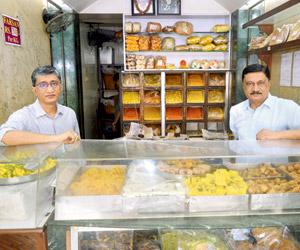
It might be tough to equate the dusty suburb with carpets of berries and trees of mangoes, but early settlers talk of a different time
Bachu was a happy, if overworked, man. In the 1960s he proudly plied up and downhill as conductor on the single public bus circling grassy slopes of the suburb the English spelt "Berewlee". In charge of the dodge ferrying kids of Mary Immaculate School during the first half of the day, Bachu and the driver put in double duty: after school hours the same vehicle became No. 292, Borivli's solitary BEST route. Bachu rented out tongas as well. Tethered at the station, these clopped along with passengers to drop at local addresses. Entrepreneur Amol Dalal remembers this back-to-back bus operating from 1968 to 1972, his primary school years. His stockbroker uncle Bhupen assures me, "You'll love our gaam which gets its name from bora fruit berries falling in carpets on the ground. It was a perfect hill station, with the fragrance of mangoes as you entered."
ADVERTISEMENT
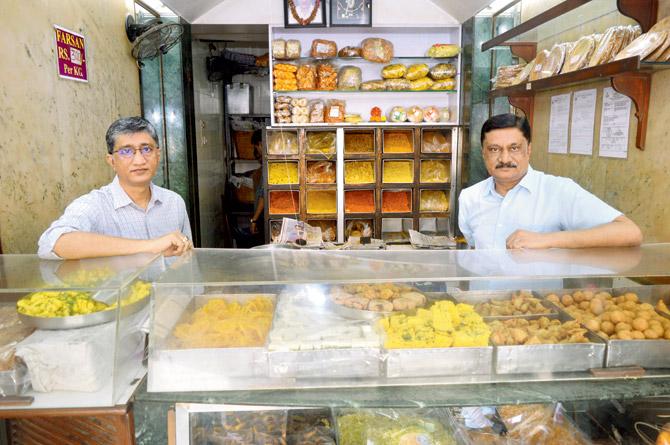
Sunil and Rakesh Shah at the farsan shop their father introduced Borivli to in 1953. PICS/FALGUNI AGRWAL; (Inset) An archival image of Mukundrai Shah at the old Bhavnagri Farsan House
The coconut flavoured copra keri is a mango unique to Borivli. Groves of it, beside flame of the forest trees and rose orchards, turned reluctant migrant Viraf Mulla to a diehard Borivlian. "We shifted in the '70s from Dhobi Talao," he shares. "My father worked for the Life Insurance Corporation - the LIC and Indian Christian colonies are biggest here. Moaning about missing friends, we were unprepared for the sight right after Kandivli. It drizzled, a rainbow peeped between the National Park hills. 'Nice!' we said and never looked back."
Nor did Deepak Chikhal's family, choosing Borivli over congested Kalbadevi where they settled from Jam Khambalia. Cloth merchants from his grandfather Narottam Vallabhdas' heyday, they welcomed tonga horses drinking from their compound tank. Elephants from Gemini and Kamala Circus bathed in it too. In exchange, the Chikhals got free passes to Big Top shows plus tonga rides. Another transport perk saw two gardeners carrying office files in thelas, walk to the station. They told the motorman to await their employers headed to the midtown Chikhal mill. Not until the instruction, "Seth busleh (Sir has sat)", did the steam engine puff southwards.
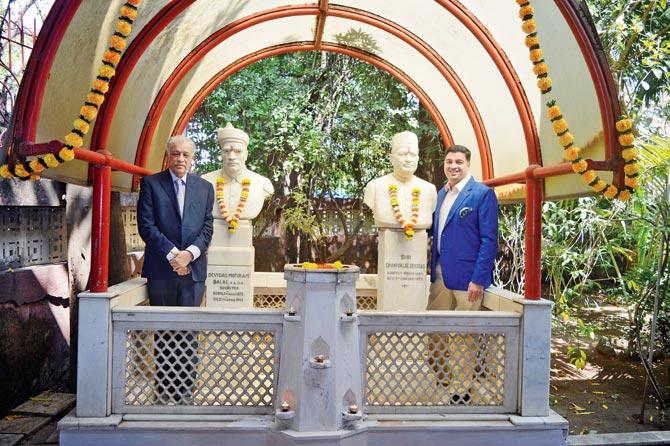
Five generations meet as Bhupen Dalal stands with son Satyen before diyas lit at the family's Kuldevta temple, Vayudevta Mandir, on Devidas Road - named after family patriarch Devidas Motiram Dalal, whose bust is seen (left) in the background with that of his son Champaklal Devidas
Trains chugging Colaba to deserted Borivli from 1928, the Dalals enjoyed similar privilege. "They started when Dada's car landed on the platform," says Amol. His 85-year-old aunt Tarla Kinkhabwalla describes their Manju Villa menagerie: rabbits, dogs, cats, cows and bullocks to stabled elephants and camels taken for melas like the Kumbh. St Francis School rose in place of Balabhai Nanavati's home near Mandapeshwar Caves, the 8th-century excavated Shiva shrine (literally, "mandap pe eshwar", hall of painting of the Lord). I stare sadly at defaced bas reliefs - to think this used to be a vital trading halt. Kinkhabwalla recalls meeting Gandhiji at the Nanavati bungalow. Incidentally, Kora Kendra in the heart of Borivli, whose barracks produce lakhs of Tricolour flags, houses a wonderful photographic display of the Mahatma's life.
The Dalal bungalow was named for Bhupen's father's sister Manju who died in childbirth. Her husband expired a little later. Though grief-struck at losing his only daughter, Devidas Motiram Dalal was grateful the chronology had not reverse-twisted. Widowed at 23, she could face cruel stigma then. Devidas Dalal, of solicitors Jamshedji, Rustomji and Devidas, lent his name more lastingly to a Borivli street. Reaching Devidas Road through tricky traffic, I relax at their Kuldevta temple. Busts of Devidas and his son Champaklal adorn a cool niche. "At 75 years, this Vayudevta Mandir is as old as me," remarks Bhupen. It is one of very few in the country dedicated to the wind god Vayu. The Dalals constructed a still standing sanatorium on the premises in 1942. Up ahead, devotees clang heavy bells in over a century old Ram Mandir.
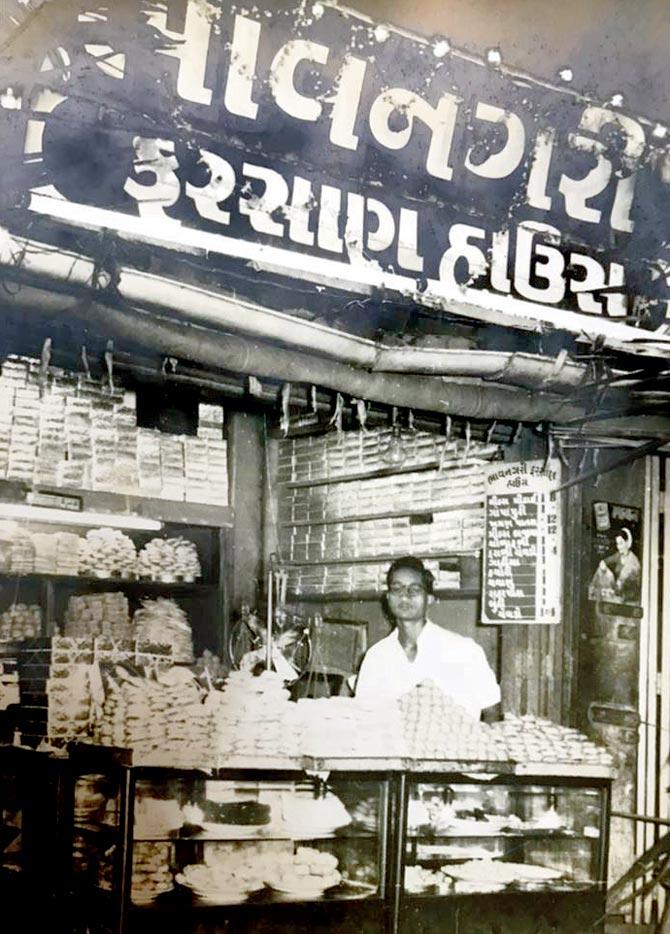
Borivli is soil on which Swami Vivekananda trod. The philosopher rested at Samudra Villa, en route his path to meditation at the basalt rock Kanheri Caves in Sanjay Gandhi National Park. In an essay on Vivekananda's city hosts, Swami Shuddharupananda writes: "The Borivli bungalow of Chhabildas Lallubhai was where he entertained. It is possible Swamiji was lodged in this... In the evening many people visited to listen to his talks." A young man called Chandrakant was among them. His guru passing on, the disciple stopped daily by that same house, hands folded in salutation. Curious passersby watched this routine till he died at a ripe age, says Sunil Goragandhi, great-grandson of Chhabildas Lallubhai (grandfather of Sunil's mother Hansa Khot, Lallubhai bequeathed Bombay the Chhabildas High School which cradled Marathi theatre in Dadar).
After fluffy idlis and filter coffee at cousins Sunil and Jayesh Goragandhi's cafe on the SV Road-Chandavarkar Lane corner, we gaze at creeper-crusted ruins of the Harilal Vallabhdas Jeevandas Goragandhi Sanatorium. The entrance marble plaque announces it was built in 1878 by Jeevandas. Chatting next with Vijay Wani, I discover his father Vasant looked after the Kanheri Caves, posted here from Aurangabad in 1971 as conservation assistant by the Archaeological Survey of India. "As kids we explored the caves on Sundays, the jungle safe even at midnight," Vijay says. "Tourists queued at this site that loafers and graffiti abuse." Like other gaothans, of roughly 37 left in the city, Borivli's are veritable oases. Gentler native rhythms blot the chaos and clog of arterial roads into oblivion. Astrologer Sunil Chogle's vintage cottage beyond Hanuman Mandir has seen 107 summers flood sunlight into wide-windowed rooms. He says, "Tracing lineage from the reign of Raja Bhimdev, the Chogles descended from Kshatriya Pathares of Kolhapur. They occupied these tracts since 1172 and owned 24 acres till Dahisar that the British partly rented for troops in tents."
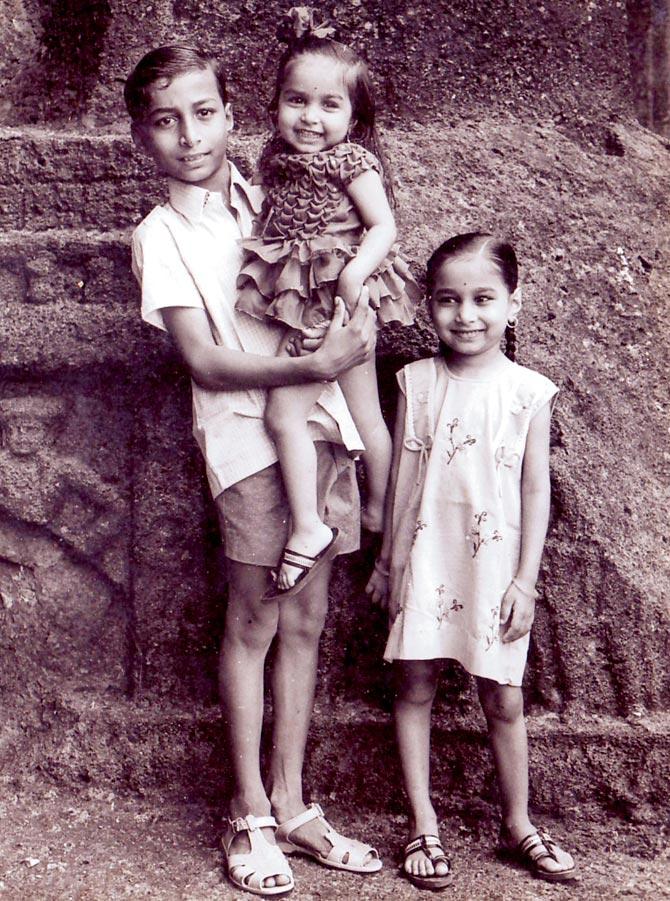
Vijay Wani with his sisters at the Kanheri Caves in 1972, a year after their father Vasant Mahadu Wani (Below: seen with his daughter) was appointed conservation officer at the site by the Archaeological Survey of India. Pics Courtesy/Vijay Wani
Forming 30 generations of Sutars, these carpenters contributed to Victoria Terminus and the Municipal Corporation Building. "Their heroism against 15th-century invaders threatening the Koli and Bhandari villages of Shimpoli, Vazira, Babhai and Eksar, earned our forefathers the title of Chargula (inspectors of four villages) anglicized to Chogle." A rambling clan with seven branches, the Chogles contributed land for Borivli's crematorium. From gaothan calm it's back to Borivli boom with the affable Ganjawala brothers, Girish, Narendra and Bharat. Establishing a tobacco business in Gulal Wadi-Bhuleshwar, their great-grandfather Purshottamdas Pranjivandas bought a home here in 1906 with an unheard of luxury: a swimming pool. "He loved Borivli's peace," says Bharat. "We've gone heaven to hell with haphazard development," adds Girish. Narendra offers: "Fireflies glowed in rain and Diwali got chilly with dewfall. Bulbuls, mynas and kingfishers were common birds - today there are just kagdas and kabutars."
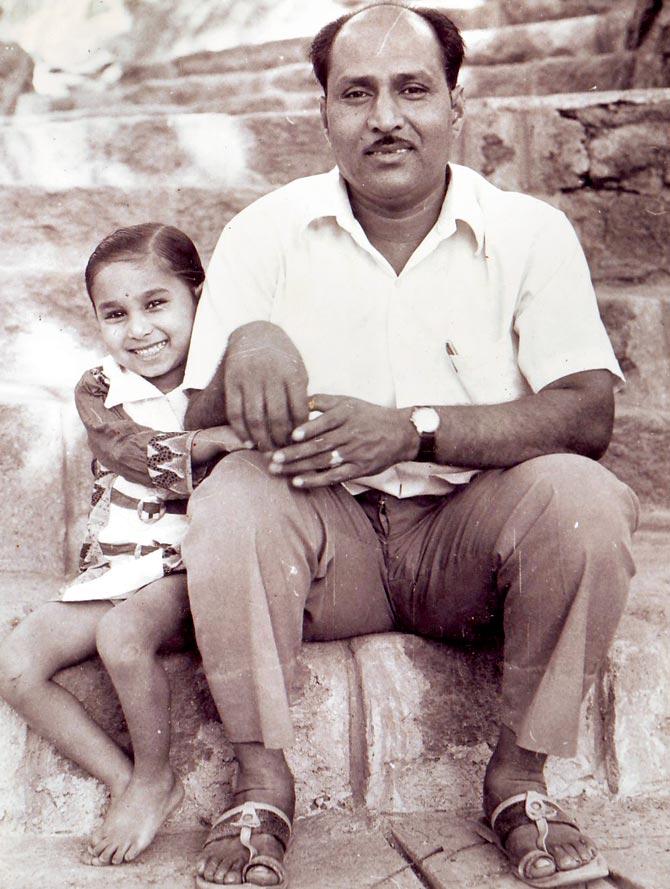
At Bhandarkar Medical and General Stores, once the suburb's sole shop, I learn from Arun Bhandarkar that his grandfather Achyut from Mangalore opened Gopal Krishna restaurant in the '40s, followed by this store. The road behind leads to stone walled Borivli Court and Bhavnagri Farsan House. "Our USP is two-three batches of namkeen items, from sev gathia and samosa to khandvi and kachori, made fresh twice each morning and afternoon," says Rakesh Shah. Pointing to the portrait of his father Mukundrai, who introduced Bhavnagri Farsan in 1953, Shah says, "He fed hungry tangawallas hanging around the station in hope of customers."
Six men squat in a semi circle at Shahabuddin Shah Dargah in Eksar gaon. Ebrahim Mullah and Bashir Sendole repeat accounts of Mukundrai's largesse to Konkani Muslim tangawalas - he thought nothing of quietly packing twice the quantity of snacks they bought for 10 rupees. Wizened wise at 87, Husain Chacha from Wardha tells me an Omani Baba proved healing powers in these swampy wilds overrun by snakes more than two centuries ago. I talk to 65-year-old Munawar Chogle who clocked in multiple duties at now shuttered Jaya Talkies which he joined as a lad of 18. "I managed its canteen, sold tickets and ice cream for Balcony seats and handled the projection room," he says.
More kindness to cheer from time spent with Mark D'Souza's family in IC Colony, which retains homes like Arthur Lodge and Chateau Letitia from the '50s. Fish from Gorai beach, meat and chicken as diet staples, more cold storages dot this area than I've seen growing up in 1960s Catholic Bandra. It is simpler fare that fills 56 free-of-cost, nutritious meals D'Souza packs and delivers daily to lonely elders with his son Kirk. "I've had a tough childhood," he shares. "Now I have several parents to serve." With wife Yvonne, he also cares 24/7 for six old ladies in a small flat. I halt longer by the bed of a toothy nonagenarian. Breaking into a peppy Portuguese song, she blesses my kids. Body blows may change Borivli. Its soul beats on strong.
Author-publisher Meher Marfatia writes fortnightly on everything that makes her love Mumbai and adore Bombay. You can reach her at mehermarfatia@gmail.com
 Subscribe today by clicking the link and stay updated with the latest news!" Click here!
Subscribe today by clicking the link and stay updated with the latest news!" Click here!







